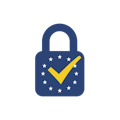First-class digital security
Securing your online identity is a top priority. Itsme® protects your personal data and guarantees a secure connection every time you use the app. Certified at the highest level of security, itsme® ensures your safety online.

A unique combination
Your digital identity can only be used on your smartphone, using the itsme® app you have installed and your personal secret code. This method is also called multi-factor authentication (MFA). This way, only you have access to it.
A passwordless login
No need to choose, remember and manage a different password for each website or app. With itsme® you can log in anywhere without a password. Your itsme® is the encrypted and secure authentication key that you manage from your itsme® app.
No consent? No action
Whenever you use itsme®, you must always confirm and enter your secret code yourself. This ensures that your personal data is never shared without your permission.
Highly secure technology
itsme® combines various technologies and systems to guarantee the security of your personal data.
Icons for extra security
The first time you log in on a computer or a tablet an icon will pop up. Selecting the same icon in the itsme® app secures the connection between your browser and your app. When signing with itsme®, selecting an icon will be requested for every signature.
This is an extra security measure.
Secure connection with every partner
Each itsme® partner (your bank, your insurance, your telecom operator,...) has a unique connection and uses asymmetric-key cryptography: one key to encrypt the data and another key to decrypt it. Encrypting the data ensures that the information is unreadable by anyone except the designated partner.
Certified digital identity
itsme® emphasises the confidentiality and integrity of personal data. So we always comply with European regulations on security and privacy.

eIDAS: identity with level of assurance high
itsme® has been officially recognised by Europe as a reliable means of identification, at high level. The itsme® app therefore fulfils the highest security requirements of eIDAS (European regulation on electronic identification and trust services for electronic transactions).

eIDAS: Qualified Trust Service Provider
A signature with itsme® is a Qualified Electronic Signature acknowledged by eIDAS and all EU member states. This signature has the same legal value as a handwritten signature.
ISO: ISO/IEC 27001:2013 certified
itsme® is ISO/IEC 27001:2013 certified for its information security management, ensuring the highest standards of availability, confidentiality, and integrity for user data in the itsme® app.
EBA guidelines
itsme® works closely with the banking sector and is compliant with a series of uniform rules applied by the European Banking Authority (EBA).
PSD2 guidelines
itsme® offers a mobile solution for strong multi-factor authentication and is fully compliant with the European PSD2 directive.
GDPR guidelines
itsme® complies with the General Data Protection Regulation or GDPR wich comprises a series of rules designed to better protect the data of European citizens.
NIS directive
The NIS Directive is the first piece of EU-wide legislation on cybersecurity. It provides legal measures to boost the overall level of cybersecurity in the EU.
Anti-money laundering
We are compliant with Anti-Money Laundering (AML) regulations. These internationally endorsed global standards (endorsed by the FATF) help detect and report suspicious activity, including offenses involving money laundering and terrorist financing.
The Digital Operational Resilience Act (DORA)
The Digital Operational Resilience Act (DORA) is a unified approach for mitigating all ICT-related incidents in Europe's financial industry. It replaces multiple ICT risk management frameworks and requires ICT Third-Party providers to conform to regulatory standards.


